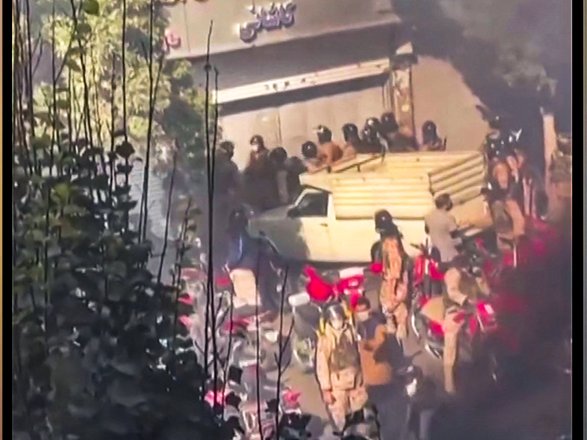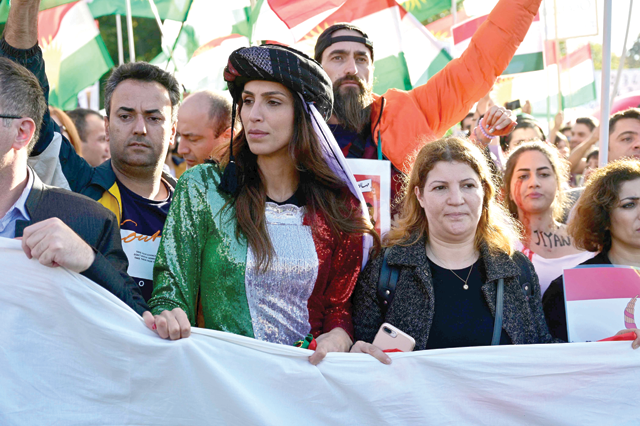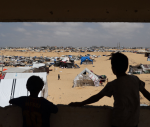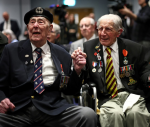You are here
Fame no shield from 'frightening' Iran arrest wave
Oct 10,2022 - Last updated at Oct 10,2022
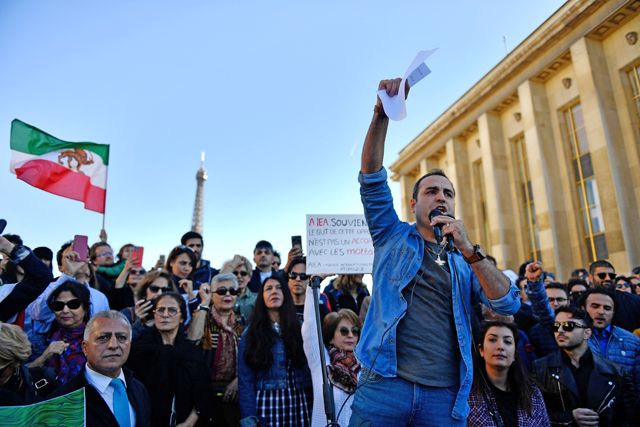
A demonstrator speaks in a microphone during a rally in support of Iranian protests in Paris on Sunday (AFP photo)
PARIS — An international footballer, an influential tech-blogger, a woman who was merely eating her breakfast without a headscarf.
In Iran no-one who expresses dissent from the ruling theocratic system, including the famous, is safe from being caught in the dragnet of a crackdown that has seen hundreds arrested in more than three weeks of protests.
Activists say that when the unrest erupted last month over the death of Mahsa Amini, 22, who had been arrested by the notorious morality police, the authorities initially resorted to lethal force, killing dozens in the space of days.
But, as well as keeping up the threat of force, authorities are increasingly resorting to arrests, with a particular focus on those who promote videos of protests or anti-regime messages on social media.
"They have gone for all for them — cultural activists, women's rights activists and journalists. Anyone who could transmit information to the outside world or to the internal networks," said Roya Boroumand, director of the Washington-based Abdorrahman Boroumand Center.
"There have been mass arrests," she added.
The Centre for Human Rights in Iran (CHRI), a New York-based non-government group, said that according to its count at least 1,200 people have been arrested, including at least 92 members of civil society who were detained not at street protests but arbitrarily at their homes or at work.
'Most important tactic'
The nature of the current protests, and the authorities' reaction, are different to the last major street protests, in November 2019, when Amnesty International accused the authorities of killing at least 321 people in a week of bloodletting.
This time the demonstrations are spread across the country, involve a wide range of social groups, and have already lasted over three weeks.
They have taken many different forms, from street marches and student protests to individual acts of defiance such as women removing or even burning the obligatory headscarf.
The authorities' "most important tactic now is detaining hundreds, even thousands of people," said Shadi Sadr, director of the London-based Justice for Iran group, which seeks accountability for human rights violations in the Islamic republic.
“They don’t kill on the scale they are capable of — though they may do in the near future — but by detaining hundreds of people who would be considered to be leading figures of these protests.
“They believe they can control the protests so that they slowly and gradually die down.
“If they conclude that this tactic is not working, they can use a final and decisive move,” she warned. “We have to be ready for that.”
Well-known figures
Even before the current surge in arrests, Iran was in the throes of a crackdown that had seen the detentions of prominent figures including filmmakers Jafar Panahi and Mohammad Rasoulof, both of whom remain under arrest.
The list of those rounded up so far includes prominent athletes, artists, journalists, lawyers, activists, technology experts as well as students and ordinary members of the public.
International footballer Hossein Mahini was arrested for supporting the protests, while ex-football legend Ali Karimi, believed to be living outside Iran, has been charged over his social media activity.
Ali Daei, once the world’s top international goalscorer in men’s football, had his passport confiscated on returning to Tehran from abroad after bitterly criticising the Islamic republic on social media.
He told AFP on Monday it had been returned “after two or three days”.
Reports from Iran also said the passports of traditional singer Homayoun Shajarian, the son the of legendary singer Mohammad Reza Shajarian and an acclaimed performer himself, and prominent actress Sahar Dolatshahi had been confiscated at the airport.
Singer Shervin Hajipour, whose song about the protests became a viral sensation, was detained although he has since been released on bail and posted a video shared by media inside Iran where he described the situation as a “misunderstanding”.
Meanwhile, four Tehran lawyers known for dealing with sensitive cases — Mahsa Gholamalizadeh, Saeid Jalilian, Milad Panahipour and Babak Paknia — are all under arrest, the CHRI said.
‘Frightening sign’
The Washington-based Committee to Protect Journalists says over two dozen journalists are being held including two female reporters, Nilufar Hamedi and Elahe Mohammadi, who exposed Amini’s case by reporting respectively from her hospital and funeral.
Another prominent victim of the arrest wave was Amiremad Mirmirani, better known as Jadi, one of Iran’s most prominent technology bloggers who was picked up on October 5 when security agents stormed his house.
“This latest crackdown on technologists is a frightening sign that no voice or form of expression is being spared in this fiercely securitised atmosphere,” rights organisations including Article 19, a freedom of expression group, said in a statement.
Campaigner Hossein Ronaghi, who as a Wall Street Journal contributor was bitterly critical of soft Western media coverage of Iran, has now been held for two weeks in solitary confinement and is suffering from a broken leg sustained in custody, according to his brother Hassan.
Young Iranian woman Donya Rad was detained in late September after a picture that went viral on social media showed her and a friend enjoying breakfast in a Tehran cafe without their headscarves.
She was finally released over the weekend after 10 days in detention, her sister Dina wrote on Twitter.
“This isn’t a crackdown, it’s an attempt to obliterate civil society,” said Hadi Ghaemi, executive director of the CHRI. “Iran’s government keeps revealing that it’s terrified of its own people.”
Related Articles
PARIS — Iranians staged new protests on Tuesday to denounce the country's theocratic regime in defiance of a crackdown that has seen promine
PARIS — Rights groups voiced alarm on Tuesday over the extent of an Iranian crackdown on a Kurdish-populated city that has become a hub for
PARIS — Shopkeepers and factory workers went on strike in Iran on Saturday as women-led nationwide protests sparked by the death in custody


